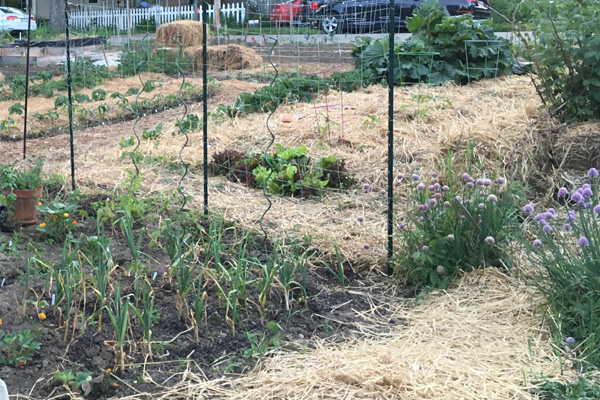Lead contamination in garden soils
February 26, 2014 - Ken Doyle
Growing your own vegetables can be a great practice for homeowners and renters. It promotes a healthier diet, saves money, and provides exercise. But there's one ingredient backyard gardeners may not realize they might be adding to their vegetables—lead.
A study published online last month in the Journal of Environmental Quality looked at lead contamination at an urban community garden in Kansas City, MO. The study measured lead concentrations in the soil before planting and at harvest. The researchers then checked lead concentrations in the edible portions of vegetable samples after harvest. They also tested the amount that was "bioacessible" using chemical reactions designed to simulate human digestion. Bioaccessible means the lead can be dissolved in the gut and absorbed by the body.
 According to Ganga Hettiarachchi, a professor of soil and environmental chemistry at Kansas State University, the two most common sources of lead in garden soils are from the past use of lead-based paint and leaded gasoline. Other, less common sources include some types of pesticides, smelters, coal-based furnaces, and lead-acid batteries.
According to Ganga Hettiarachchi, a professor of soil and environmental chemistry at Kansas State University, the two most common sources of lead in garden soils are from the past use of lead-based paint and leaded gasoline. Other, less common sources include some types of pesticides, smelters, coal-based furnaces, and lead-acid batteries.
People can be affected by lead in soil mainly by accidentally ingesting contaminated soils and to a lesser extent, by eating lead-contaminated food or inhaling contaminated soils (for instance, contaminated dust when gardening).
"Absorbed lead tends to be held in roots…minimizing transfer from roots to shoots or fruits," says Hettiarachchi. That's why root vegetables, such as carrots or sweet potatoes, could potentially contain the most lead. Leafy vegetables, like lettuce and Swiss chard, are next. Fruiting vegetables, like tomatoes, are least likely to contain lead absorbed from soil.
The study found that adding organic matter—like compost—to soils changes the absorption of lead. "Compost addition will dilute overall lead concentration in soil," says Hettiarachchi. In turn, this reduces the amount of lead absorbed by the vegetables. Some substances in compost--notably phosphorus and iron oxides--"can help holding lead in soils and thereby reduce its availability to plants," Hettiarachchi notes. Enriching the soil with compost also helps increase fertility. As a result, the overall size of vegetables increases, diluting the amount of lead they contain. The effects of using compost can be striking. In the study, addition of compost cut the available concentration of lead by as much as one-half.
The study also examined ways to reduce accidental ingestion of contaminated soils, by comparing different methods of washing vegetables. Hettiarachchi recommends careful and thorough washing of vegetables with high-quality water. "If the vegetables are hard to clean," she says, "then peel or remove highly soiled parts."
A little preparation goes a long way when it comes to backyard gardening. Reducing lead contamination can be as simple as choosing the correct site. "If you have an old home, get your soil tested for lead," says Hettiarachchi. She suggests not growing vegetables in areas close to the house, as they are most likely to contain flakes of lead-based paint.
If soil tests indicate lead contamination, you still have options for growing vegetables. "Consider not growing root crops directly in garden soils," says Hettiarachchi. Container gardening can be an effective solution in these situations. Hettiarachchi also recommends removing the outer or lower leaves of vegetables grown in contaminated soils. This precaution will minimize accidental ingestion of soil.
Finally, Hettiarachchi says, "Make sure to maintain the pH and nutritional conditions suitable for the vegetables you are growing." pH is a measure of how acidic or alkaline soil is, and it can affect how much lead is held by the soil. Many gardeners use lime to make soil more alkaline. Adding sulfur or peat will make soil more acidic. Hettiarchchi adds that neutral or slightly alkaline soils hold more lead, so may be preferable if you are concerned about lead in your soils.
By following the precautions mentioned in the study, homeowners with lead-contaminated soils can still enjoy a healthy harvest of fruits and vegetables.
View the abstract at: http://dx.doi.org/doi:10.2134/jeq2013.07.0273
